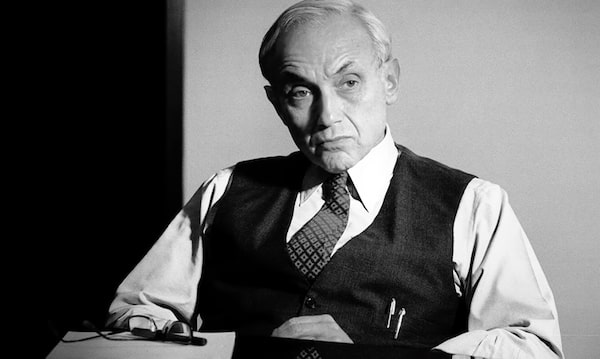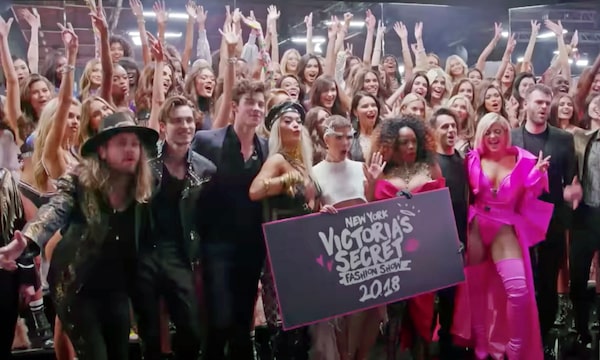
Victoria’s Secret: Angels and Demons is a three-part, three-hour doc-series that tells the story of the Victoria's Secret brand and its CEO, the enigmatic billionaire Les Wexner.Courtesy of Amazon Prime Video
All approaches to recent history are revisionist in some way, but what we’re seeing right now is highly peculiar. We are seeing a series of obituaries for the popular culture of the 1990s and early 2000s. Not long ago, on Netflix, there was White Hot: The Rise and Fall of Abercrombie & Fitch, which laid waste to that chain’s once-proud claim on the fashion zeitgeist and suburban mall culture.
Victoria’s Secret: Angels and Demons (streams on Amazon Prime Video) is the latest and carries an even greater significance because of the ties between convicted sex offender Jeffrey Epstein and the lingerie company. Connections are made and assertions made, too, but like so much about Epstein, it’s all rather opaque. There is less here than meets the eye, no matter how much footage there is of lingerie models and photos of Epstein attending Victoria’s Secret events.
Catch up on the best streaming TV of 2021 with our holiday guide
Toward the end of the first hour of the three-part, three-hour doc-series, a former Victoria’s Secret executive, a woman, makes a claim. She says that in 1993 she was contacted by a woman who said that she had encountered a man in New York City who claimed to be a recruiter for the Victoria’s Secret catalogue. The exec asked if the woman knew the man’s name and the reply was, “Yes, Jeffrey Epstein.” The exec’s first thought was, “Oh boy, this is trouble.” She says she reported the facts to the company CEO, Les Wexner, who promised to tell Epstein to stop doing that.


The series makes clear that Wexner, top, and convicted sex offender and disgraced financier Jeffrey Epstein were something beyond buddies.Courtesy of Amazon Prime Video
Thing is, as the series makes very clear, Wexner and Epstein were something beyond buddies. When Wexner made the decision to move from Columbus, Ohio, where he had become a billionaire by creating fast-fashion outlets, he wanted the cachet that came with being a billionaire in the Big Apple. It was Epstein who tried to provide an entrée. The Manhattan townhouse that became a key part of the lurid and horrifying stories about Epstein had been owned by Wexner when Epstein bought it. And Epstein, at one point, had full power of attorney over all of Wexner’s assets.
It is made clear that Wexner, who declined to be interviewed for the series, denies he had knowledge of Epstein’s wrongdoings and says he cut Epstein off in 2008 after Epstein pleaded guilty to a felony charge of solicitation of prostitution involving a minor.
We are left then with a set of mysterious connections that stay murky. The only thing that’s clear is that Epstein haunts the story of Victoria’s Secret and stays a ghostly figure. Much as this series, made by Matt Tyrnauer, tries to paint a clear picture of sinister men exploiting young women, a thoroughly resounding case is not made.
What we do acquire, mind you, is an excellent primer on fast fashion. Also, there’s what amounts to a seminar on brand messaging. Wexner was a retailing genius for a period, with a strong business sense about what women wanted to wear. His father had opened a women’s dress shop in Columbus, but Wexner launched his own, outdoing his dad and just kept expanding. He was outsourcing the manufacturing to China before anyone else.

The annual Victoria’s Secret Fashion Show was a popular TV ritual.Courtesy of Amazon Prime Video
The core story, though, is the Victoria’s Secret brand. The ease of its rise and dominance is a remarkable story, anchored in the ruthlessness and drive of Wexner’s marketing guy, Ed Razek. It’s not that long since the annual Victoria’s Secret Fashion Show was a popular TV ritual, airing mostly on CBS in late November or early December, for the Christmas market. It was an infomercial presented as a good, old-fashioned American celebration.
The final part of the series makes valid points about the billionaire class in the United States and their remoteness from ordinary life and rules. But that’s tied more to the decline of Victoria’s Secret than it is firmly tied to the exploitation of women by men associated with the company. Something is exposed here but not entirely. People’s taste changed, women’s feelings about their own bodies and strength changed, but Victoria’s Secret didn’t change. As casting director James Scully, who at one point chose the models, says about people such as Wexner, “The world at large moved on from it, and they didn’t.”
There is much to glean from the series, some of it very sobering, and some of it formidably creepy. It is revisionist but doesn’t reveal enough.
Plan your screen time with the weekly What to Watch newsletter. Sign up today.